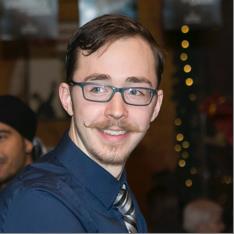Featuring Phil Grayson

BioScience Alumnus Phil Grayson talks about his time at Harvard
Can you tell us about the program you graduated from at UW, and the research you did here?
I graduated with my MSc in Bioscience, Technology and Public Policy in 2013. I worked with Dr. Alberto Civetta, investigating the molecular evolution of male reproductive genes in mammals. Reproductive genes are among the most rapidly evolving genes known to science, which makes them an incredibly interesting group to study. I published two papers during my master’s, each examining a different family of genes. The first paper began as an assignment for a class taught by Dr. Sara Good. In it, I describe the evolutionary history of the Izumo gene family in mammals. Izumo1 is of particular interest to me, since it is rapidly evolving under positive selection despite a well-conserved essential role in mammalian sperm-egg binding. The second manuscript came out of the main body of my master’s thesis, which was an examination of the evolutionary history of all sperm-expressed members of the ADAM gene family in mice. I sequenced 16 ADAM genes in five species of mice and identified rapid evolution driven by positive selection in a number of these reproductive genes, including all six that were known interact and form complexes on sperm.
How did you end up at Harvard? Were there any other contenders?
During the second year of my master’s, I applied to three PhD programs in The US - Syracuse, UC Berkeley, and Harvard. I was offered grad student fellowships at all three universities, and in the end, I chose Organismic and Evolutionary Biology (OEB) at Harvard. All three schools had excellent programs and advisors, but the specific project and genomics resources at Harvard sealed my fate. My advisor, Dr. Scott Edwards, has been incredibly supportive throughout my first two years and I look forward to the remainder of our time together. I just passed my oral qualifying examination in June and this summer has been a whirlwind of research and travel for conferences and celebrations!
Are you building on the research you did here at UW?
I am proud to say that I am building upon the research that I began at the University of Winnipeg! Recently, the binding partner for Izumo was discovered and I have just submitted a paper that examines the evolutionary history of its gene family, building upon and expanding my knowledge of the Izumo family. Although this project is completely separate from my PhD dissertation work, which focuses on the genomics and evolutionary developmental (evo-devo) biology of large flightless birds, my dissertation work does build upon the critical thinking, as well as the laboratory skills and techniques that I developed at the University of Winnipeg with my peers, and under the tutelage of many excellent professors (Dr. Scott Forbes, Dr. Alberto Civetta, Dr. Sara Good, Dr. Judy Huebner, and Nancy Loadman to name a few). Over the past year, I have sequenced 10 bird genomes that are new to science and a number of transcriptomes. Additionally, I am transitioning into the world of evo-devo in Dr. Clifford Tabin’s laboratory at the Harvard Medical School. I am carrying out evo-devo experiments on chicken, emu, rhea, and potentially tinamou over the next year. Thankfully, I enrolled in an exciting class with Dr. Edward Byard on chicken development during my undergraduate at UWinnipeg, and those skills are becoming more useful every day.What was the best part of your MSc?
Hands down, the best part of my MSc was the people. I made great friends with my lab mates as well as other students within my cohort, and I grew tremendously as a person and a scientist over those two short years. UWinnipeg also provided great opportunities for funding, which has helped me throughout both my graduate degrees. I was supported by NSERC for one year of my MSc, and they generously offered me 3 years of additional support (PGS D3) here at Harvard.
Have you kept in touch with your previous supervisor/research collaborators?
I have kept in touch with a number of my previous advisors (especially Scott Forbes and Alberto Civetta). I hope to return to UWinnipeg this summer or next summer to carry out some of my dissertation work in Alberto’s laboratory!
What is Harvard like?
Harvard is a wonderful place to be for my PhD. The opportunity to work with some of the brightest and most successful scientists alive today is something I am truly grateful for. Boston in general is a real hub for science, and I like to tell prospective students that there’s an expert on almost anything you could want to know within a 30 minute bike or subway ride. This makes collaboration incredibly powerful and allows students to learn new techniques quickly and easily. Culturally, Boston feels like a slightly bigger Winnipeg and my wife (a fellow Winnipegger) and I love to go see concerts and take in festivals with our friends whenever we get the chance. Unfortunately, we haven’t found anything that quite replicates Soul Night at the Cavern yet, but that’s not surprising since Osborne Village is tough to beat.
For more information on Phil’s research, visit here.
Visit here for more alumni features.
